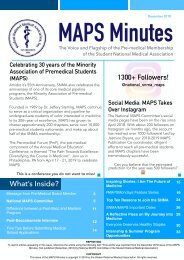JSNMA SUMMER 2019 Sneak Preview
You also want an ePaper? Increase the reach of your titles
YUMPU automatically turns print PDFs into web optimized ePapers that Google loves.
58 Opinion<br />
A REFLECTION ON THE<br />
IMPORTANCE OF PHYSICIANS<br />
OF COLOR IN TREATING<br />
UNDERSERVED COMMUNITIES<br />
ASHLEY PINCKNEY, MBS, OMS-II<br />
PHILADELPHIA COLLEGE OF OSTEOPATHIC MEDICINE<br />
E<br />
ach year, African Americans<br />
continue to be a medically<br />
underserved population in<br />
our communities. As I continue on<br />
my journey to become a physician,<br />
I become more and more aware<br />
of the overwhelming healthcare<br />
disparities affecting patients of color.<br />
According to the Center for<br />
Disease Control and Prevention<br />
(CDC), African American patients,<br />
ages 18-49, are<br />
twice as likely to die<br />
from cardiovascular<br />
disease than any<br />
other race. Younger<br />
African American<br />
patients are living<br />
with chronic diseases<br />
such as hypertension<br />
and diabetes, whereas<br />
these diseases often do not affect<br />
patients of other races until they<br />
are much older. When comparing<br />
the CDC’s data on deaths from<br />
cardiovascular disease and the<br />
United States Census Bureau’s<br />
racial geographic data, it is not<br />
far fetched to conclude that<br />
African Americans make up a<br />
large proportion of the patients<br />
experiencing these poor health<br />
outcomes.<br />
I believe the largest impact that<br />
can be made on such disparities<br />
is by physicians of color. Simply<br />
put, our communities need more<br />
doctors who look like them. As a<br />
medical student, I have witnessed<br />
countless lecturers emphasize<br />
the importance of a patient’s<br />
health history and the physicianpatient<br />
relationship. Yet, how<br />
many patients of color are willing<br />
to reveal their true selves to their<br />
physicians when there is a lack of<br />
...African American patients,<br />
ages 18-49, are twice as likely<br />
to die from cardiovascular<br />
disease than any other race.<br />
personal connection or perceived<br />
empathy? Not to say that the color<br />
of our skin is everything; however,<br />
it is innate for human nature to<br />
seek out those with whom we<br />
share commonalities. Something<br />
as simple as one medically<br />
underserved minority providing<br />
healthcare to another, could make<br />
the world of difference in the<br />
tortuous landscape of disparity.<br />
Health literacy also plays a<br />
significant role in the long-term<br />
outcomes of patients. When<br />
considering HIV in African American<br />
patients, low health literacy lends<br />
itself to a lack of understanding<br />
of the disease and its treatment.<br />
This could surely exacerbate the<br />
disease course and accelerate the<br />
development of AIDS. Additionally,<br />
a research study examining<br />
health literacy in asthmatic African<br />
American teenagers found that<br />
one-third of them had issues<br />
understanding<br />
their respiratory<br />
condition because<br />
they could not<br />
understand the<br />
written information<br />
provided to them<br />
regarding asthma.<br />
If patients are<br />
untrusting of or<br />
uncomfortable with their physicians,<br />
then their health literacy is at further<br />
risk. If our patients are too afraid to<br />
ask for clarity regarding their care<br />
or treatment, we as physicians can<br />
no longer expect the best possible<br />
outcomes for our patients.<br />
Clinicians of color have the ability<br />
to further connect with underserved<br />
minority patients, providing<br />
opportunities to minimize health<br />
inequity by creating a space within<br />
our clinical practices where they<br />
J o u r n a l o f t h e S t u d e n t N a t i o n a l M e d i c a l A s s o c i a t i o n






